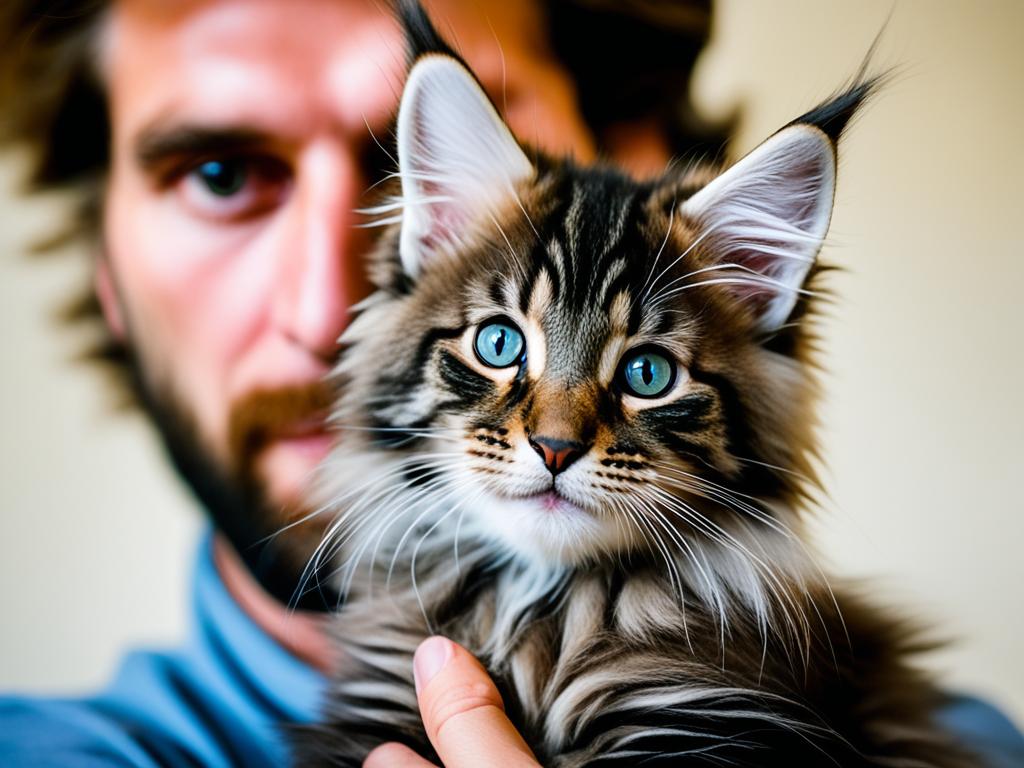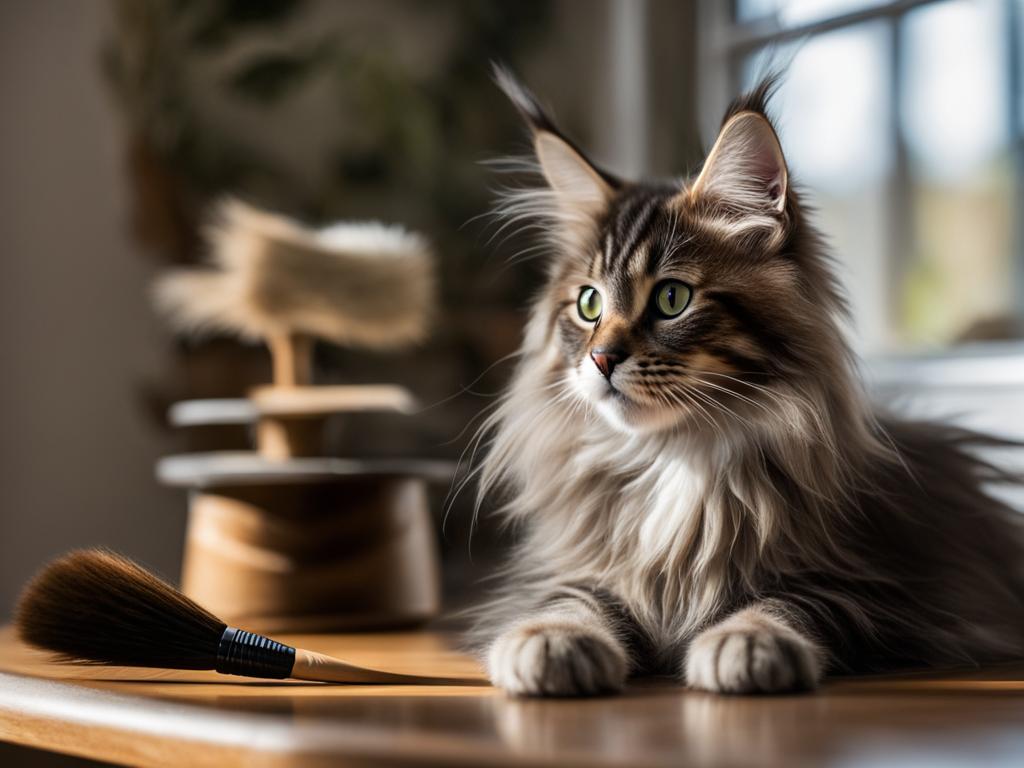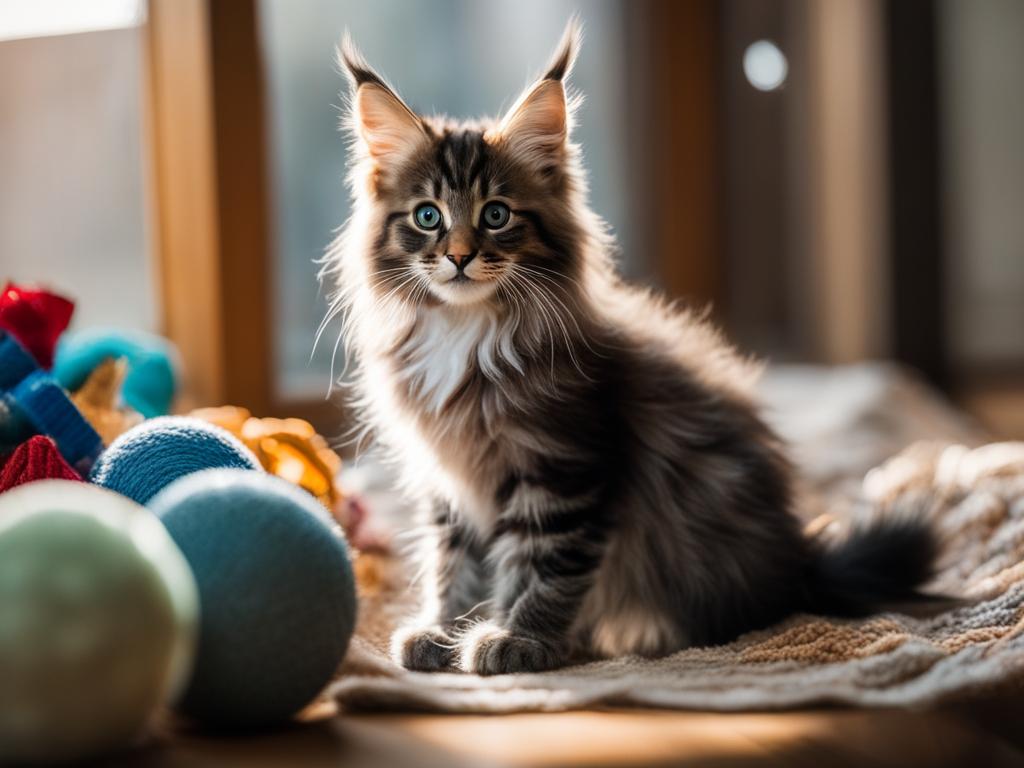Socializing a Maine Coon kitten is vital for their overall well-being and behavior. Proper socialization ensures that they grow up to be confident and friendly cats. From a young age, it’s important to introduce Maine Coon kittens to various people, household noises, and everyday interactions. This comprehensive guide provides a timeline and tips for socializing Maine Coon kittens, including holding and stroking them, introducing them to other pets, and getting them used to household noises.
Key Takeaways:
- Proper socialization is essential for the well-being and behavior of Maine Coon kittens.
- Introduce the kittens to different people, household noises, and everyday interactions from an early age.
- Holding and stroking the kittens helps them bond with humans and enjoy human touch.
- Gradually introduce the kittens to other pets in a controlled and supervised manner.
- Expose the kittens to common household noises to prevent fear or anxiety.
Timeline for Socializing Maine Coon Kittens
Socializing a Maine Coon kitten is an ongoing process that can be broken down into a ten-week timeline. Each week focuses on specific activities and milestones to ensure the kittens develop into well-adjusted and sociable cats. The following is a breakdown of the socialization process:
Week 1: Establishing Trust and Calmness
In the first week, the priority is to introduce the kitten to a calm and welcoming environment. Spend time near the kitten, allowing them to get used to your presence. Speak softly and create a positive atmosphere for them to feel safe.
Week 2: Gentle Handling
During the second week, you can start holding and gently handling the kitten. This helps them become comfortable with human touch and teaches them that physical interaction is a positive experience. Remember to handle them with care and sensitivity.
Week 3: Meeting Different People
By week three, it’s important to introduce the kitten to different people. This helps them become accustomed to various voices, scents, and interactions. Encourage friends and family members to spend time with the kitten, providing positive experiences and reinforcing socialization.
Week 4: Controlled Introduction to Other Animals
Week four is an ideal time to introduce the kitten to other animals in a controlled environment. This can be done gradually, allowing supervised meetings between the kitten and friendly pets. Positive interactions with other animals help the kitten develop social skills and reduce potential anxiety or fear.
Weeks 5-9: Playtime, Grooming Practice, and Exposure to Household Noises
During weeks five to nine, focus on providing stimulating playtime for the kitten. Use interactive toys and engage in activities that encourage physical and mental exercise. This period is also ideal for practicing grooming sessions, such as gentle brushing, to familiarize the kitten with grooming routines. Additionally, gradually expose the kitten to various household noises, such as vacuum cleaners or doorbells, in a controlled manner. This exposure helps the kittens become desensitized to common noises and develop resilience.
Week 10: Short Periods of Independence
By week ten, the kitten can gradually start getting used to short periods of independence. This is important to foster their self-confidence and prepare them for times when they will be alone. Start with short intervals and gradually increase the time. Ensure the kitten has a safe and comfortable space during these periods.
An Illustrative Table Summarizing the Timeline
| Week | Socialization Focus |
|---|---|
| 1 | Establish trust and calmness |
| 2 | Gentle handling |
| 3 | Meeting different people |
| 4 | Controlled introduction to other animals |
| 5-9 | Playtime, grooming practice, and exposure to household noises |
| 10 | Short periods of independence |
This timeline provides a structured approach to socializing Maine Coon kittens, ensuring they grow up to be confident and well-adjusted cats. Remember to be patient, gentle, and consistent throughout the socialization process, giving them plenty of positive experiences and rewards. By following this timeline and providing love and care, you can help your Maine Coon kitten develop into a happy and socially adept companion.
Human Contact and Holding Kittens
Socializing a Maine Coon kitten involves regular human contact and bonding. By establishing a connection with your kitten early on, you can help them develop trust and ease any anxiety they may have. Here are some tips on how to bond with your Maine Coon kitten:
- Start with short interactions: Begin by spending a few minutes with your kitten every half hour. Gradually increase the duration of these interactions over time. This consistent presence will help them feel more comfortable around you.
- Holding and stroking: Holding your kitten gently and stroking their fur is an excellent way to build trust and teach them to enjoy human touch. However, it’s crucial to handle them with care and respect their boundaries. If they seem uncomfortable or try to squirm away, allow them to do so and try again later.
- Positive reinforcement: Associate human contact with positive experiences by offering treats or gentle praise during your interactions. This positive reinforcement will create a positive association in your kitten’s mind and further strengthen your bond.
- Respect their individuality: Each Maine Coon kitten has their own personality and preferences. Some kittens may crave more physical contact, while others may be more independent. Respect their individuality and adjust your interactions accordingly.
Remember, patience and consistency are key when socializing a Maine Coon kitten. By investing time and effort into building a strong bond, you can raise a well-socialized and affectionate cat.

Common Mistakes to Avoid
While socializing your Maine Coon kitten, it’s important to be aware of some common mistakes that can hinder the process:
- Rushing the process: Socialization takes time and cannot be rushed. Pushing your kitten beyond their comfort zone can lead to fear or anxiety, making it harder to build trust.
- Ignoring boundaries: Maine Coon kittens, like all cats, have boundaries. It’s important to respect their personal space and not force interactions. Pushing them too far can have the opposite effect and make your kitten more wary of human contact.
- Inconsistent interactions: Regularity is key to successful socialization. Make sure to set aside dedicated time for bonding with your Maine Coon kitten every day. Inconsistent interactions can slow down the process and confuse your kitten.
By avoiding these mistakes and following the tips above, you can establish a strong and loving bond with your Maine Coon kitten.
Encouraging Playtime and Introducing Kittens to Other Pets
Playtime is an essential aspect of socializing a Maine Coon kitten. Engaging in interactive play and providing appropriate toys not only helps them develop their physical and mental abilities but also strengthens the bond between you and your kitten. Playtime should be a regular part of their routine, allowing them to expend energy and engage in natural behaviors.
When introducing a Maine Coon kitten to other pets, it is important to proceed with caution and take gradual steps to ensure a positive experience for everyone involved. Here are some tips for introducing your Maine Coon kitten to other pets:
- Start with scent exchange: Allow your Maine Coon kitten and your other pet to sniff items like blankets or toys that belong to each other. This helps them become familiar with each other’s scent before direct interaction.
- Controlled visual contact: Initially, you can allow your kitten and other pet to see each other through a baby gate or a partially open door. This allows them to observe each other without direct physical contact.
- Supervised face-to-face meetings: Once both pets show signs of curiosity and positive interest, you can proceed to supervised face-to-face meetings. Keep these meetings short and controlled, ensuring the safety of both pets.
- Positive reinforcement: During and after these interactions, provide praise and treats to both pets as a way to reinforce positive behavior and to create positive associations with each other.
Remember, every pet is unique, and their ability to adapt to new environments and other animals may vary. Always monitor their interactions closely and be prepared to intervene if necessary. Patience and consistency are key to successfully integrating your Maine Coon kitten into a household with other pets.

Getting Kittens Used to Household Noise
One of the important aspects of socializing Maine Coon kittens is getting them used to household noises. By gradually exposing them to common noises from an early age, you can prevent fear or anxiety related to these sounds. Start with low volumes and create positive associations through praise and treats. Here are some common household noises to introduce:
- Doors opening and closing
- The sound of the TV
- Using the vacuum cleaner
- Operating the hairdryer
By familiarizing Maine Coon kittens with these noises, you help them develop resilience and confidence, ensuring they feel more comfortable in various environments.
Creating a Positive Noise Experience
When exposing Maine Coon kittens to household noises, it’s important to create a positive experience. Start with low volumes and gradually increase the intensity. Use treats and praise to reward them for staying calm and relaxed. This positive reinforcement helps them associate noise with positive experiences, reducing the likelihood of anxiety or fear.
| Noise | Volume | Treats and Praise |
|---|---|---|
| Doors | Low volume | Reward with treats and gentle praise for staying calm |
| TV | Low volume | Reward with treats and gentle praise for being relaxed |
| Vacuum | Low volume | Offer treats and comforting words to encourage positive association |
| Hairdryer | Low volume | Use treats and soothing voice to help the kitten feel safe |
Introducing Maine Coon kittens to household noises helps them become well-adjusted cats who are not easily frightened by common sounds they’ll encounter throughout their lives.
Grooming Kittens
Teaching Maine Coon kittens to tolerate grooming from a young age is essential for their well-being. Regular grooming sessions help maintain their coat’s health and prevent matting. Here are some tips for grooming your Maine Coon kitten:
Brushing their Fur

Gently brush your Maine Coon kitten’s fur with a soft-bristled brush a few times a day. This helps them get used to the sensation and prevents tangles or knots from forming. Start with short brushing sessions and gradually increase the duration as your kitten becomes comfortable. Remember to be gentle and avoid pulling or tugging at their fur.
Dental Care
Start practicing dental care and teeth cleaning during grooming sessions. Use a soft finger brush or a toothbrush specially designed for cats, along with cat-friendly toothpaste. This helps keep their teeth and gums healthy. Begin by gently rubbing their teeth and gums for a few seconds, gradually increasing the duration as they become accustomed to the process.
Positive Reinforcement
During grooming sessions, offer positive reinforcement to encourage your Maine Coon kitten’s cooperation. Give them treats or verbal praise after successful grooming sessions. This positive association helps them associate grooming with positive experiences, making future sessions easier.
Short and Gentle Sessions
Keep grooming sessions short, especially in the beginning, to avoid overwhelming your Maine Coon kitten. Aim for a few minutes at a time and gradually increase the duration as they grow more comfortable. Approach grooming with patience and understanding, respecting their boundaries and adjusting your grooming routine to suit their individual needs.
Vaccinations and Preventive Care
Vaccinations and preventive care play a crucial role in maintaining the health and well-being of Maine Coon cats. As responsible pet owners, it is essential to prioritize their healthcare needs. By following vaccination schedules and implementing preventive measures, you can ensure that your Maine Coon kittens grow up to be healthy and happy.
Vaccination Schedule
The first step in protecting your Maine Coon cat’s health is to consult with a veterinarian to develop a comprehensive vaccination schedule. Vaccinations help safeguard against common feline diseases such as feline panleukopenia, feline viral rhinotracheitis, and feline calicivirus. Your veterinarian will advise on the appropriate vaccinations and their frequency based on your kitten’s age, lifestyle, and potential exposure risks.
Parasite Control
Preventing parasitic infestations is essential for the well-being of your Maine Coon. Your veterinarian can recommend suitable preventive measures to protect against internal parasites like worms and external parasites like fleas and ticks. Regular check-ups and discussions with your veterinarian will ensure that your Maine Coon receives appropriate parasite control treatments.
Regular Check-ups
Scheduling regular check-ups with your veterinarian is an important aspect of preventive care for Maine Coon cats. These routine examinations allow for early detection of any health concerns, ensuring timely intervention and treatment. Your veterinarian will conduct physical examinations, assess their overall health, and address any questions or concerns you may have.
Remember, by prioritizing vaccinations, preventive care measures, and regular check-ups, you provide your Maine Coon kittens with a strong foundation for a healthy and fulfilling life.
Maine Coon Cat Behavior and Training
Understanding Maine Coon cat behavior is essential for effective training and socialization. These gentle giants have unique traits and instincts that influence their interactions with humans and other animals. By observing their body language and behavior cues, you can better understand their needs and create a nurturing environment for them.
Positive reinforcement is a powerful tool for training Maine Coon cats. Starting with basic commands like sit, stay, and come, you can gradually introduce more advanced training exercises. Rewarding them with treats, praise, and affection when they exhibit desired behaviors encourages them to repeat those actions. Remember to be patient and consistent in your training approach, as each cat may progress at their own pace.
In addition to basic obedience training, Maine Coon cats can also be trained to walk on a leash. With proper guidance and practice, they can safely enjoy supervised outdoor experiences. This provides them with mental stimulation and helps fulfill their natural instinct to explore. However, it’s important to ensure their safety by using a well-fitting harness and keeping them away from busy roads or potential dangers.
While training and socialization are important, it’s crucial to respect the individual personalities and limitations of Maine Coon cats. Some may be more outgoing and eager to learn, while others may be more independent and require a gentle approach. By understanding and working with their unique attributes, you can develop a strong bond with your Maine Coon and create a harmonious relationship based on trust and mutual understanding.
FAQ
Why is socializing a Maine Coon kitten important?
Socializing a Maine Coon kitten is important for their well-being and behavior. It helps them grow up to be confident and friendly cats.
How can I socialize a Maine Coon kitten?
Socializing a Maine Coon kitten involves introducing them to people, household noises, and everyday interactions from an early age. It is an ongoing process that requires patience and consistency.
What is the timeline for socializing Maine Coon kittens?
Socializing a Maine Coon kitten can be broken down into a ten-week timeline, which includes gradually introducing them to different experiences and environments.
How should I hold and handle a Maine Coon kitten?
Holding and stroking a Maine Coon kitten is a great way to bond with them and teach them to enjoy human touch. It is important to handle them gently and respect their boundaries.
How can I encourage playtime and introduce my Maine Coon kitten to other pets?
Providing toys and engaging in interactive play helps in the socialization of a Maine Coon kitten. Gradual introductions and positive reinforcement can help them form positive relationships with other animals.
How can I get my Maine Coon kitten used to household noise?
Gradual exposure to common household noises, starting with low volumes, can help Maine Coon kittens associate noise with positive experiences. Positive reinforcement and praise are also important in this process.
How should I groom my Maine Coon kitten?
Grooming a Maine Coon kitten involves gently brushing their fur with a soft-bristled brush and practicing dental care. Positive reinforcement and short, gentle grooming sessions are key.
What vaccinations and preventive care does a Maine Coon kitten need?
Vaccinations and regular preventive care are crucial for the health of Maine Coon kittens. Consult with a veterinarian to develop a vaccination schedule and discuss parasite control measures.
How can I understand Maine Coon cat behavior and train them?
Understanding Maine Coon cat behavior, observing their body language, and using positive reinforcement techniques are important for training and socialization. Respecting their individual personalities and limitations is also crucial throughout the process.

Leave a Reply